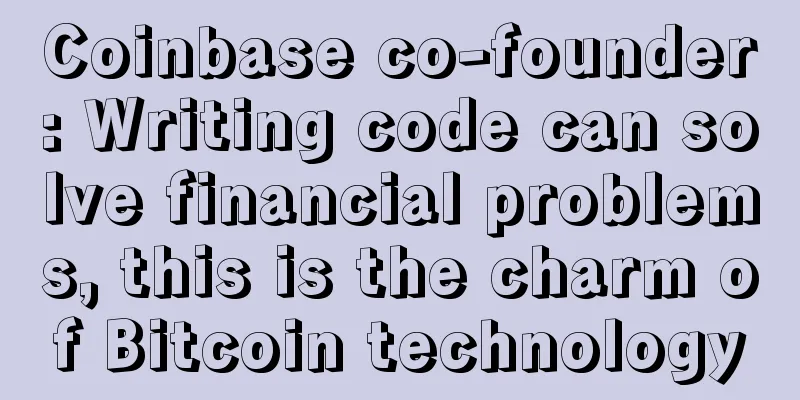Coinbase co-founder: Writing code can solve financial problems, this is the charm of Bitcoin technology

|
Coinbase co-founder Fred Elzham (left) and Coinbase CEO Brian Armstrong (right) Recently, Coinbase co-founder What is "cracking regulation"? To put it simply, we often use sports to understand corporate regulation: the rules are set in advance, and then the players follow the rules. But the reality is often that the rules follow business as much as business follows the rules. Sometimes it is startups that change the rules. Startups do not have the resources to change the rules through lobbying. So they achieve their goals by "cracking regulation": demonstrating the benefits of their ideas through "backdoor" experiments. If successful, regulators will be forced to follow the rules they set. (You can also click here to learn about the meaning of "cracking regulation") 1776 is a business incubator based in Washington, D.C., so it considers “cracking regulation” as its company philosophy, the basic premise of which is to find new ways to bend or circumvent rules that slow progress in certain industries. Elzam mentioned some of these industries in the podcast:
Bitcoin’s open source, permissionless, and censorship-resistant nature makes it a potentially powerful tool for “defeating regulation” in the financial sector. Bitcoin turns financial problems into software problemsWhen asked about his overall view on the importance of Bitcoin technology, Elzam said that it transforms a financial problem into a software problem. Compared to the highly regulated and slow-moving traditional financial system, building financial applications on top of Bitcoin technology only requires the ability to write code. Elzam then talked about the positive impact on society when real-world problems are translated into software problems:
In other words, competition based on an open, less regulated system can create a better environment for entrepreneurs and consumers. As Elzam said, "Software problems are truly governed by market forces, which are open, just like the Internet has experienced." An outdated and closed financial system is disappointingTo describe the benefits of Bitcoin’s openness, Burfield first talked about the problems of the traditional financial system. He said:
Burfield believes this is because traditional financial services companies have historically lacked an open system to compare with, so their problems are less prominent. Burfield then compared Bitcoin technology to the financial system in Africa. Generally speaking, in Africa, when the two parties are in different countries, they need to pay a fee of more than 10%. In addition, the central banks of African countries have been printing money indiscriminately, which has made the financial situation in Africa very bad. Using Bitcoin settlement not only has low fees, but also allows people to enjoy more financial autonomy. Is Coinbase the kind of business that would bend regulation?When asked about Coinbase’s approach to “decoding regulation,” Elzam was quick to point out that the concept is difficult to apply to the financial services industry today, especially in the U.S. He explained:
Bitcoin Technology Won’t Create a Liberal UtopiaWhile Burfield believes that the world needs more “hacked regulators,” he doesn’t think Bitcoin is about building some kind of libertarian utopia. He explained:
Elzam echoed Burfield’s sentiments. He added:
It’s important to remember the tension between early adopters of Bitcoin and those who want to make the technology more widely available — it’s easy for regulators to regulate businesses in the Bitcoin blockchain space, but it’s hard to regulate the technology. Some aspects of Bitcoin technology do bring more free will to the real world, but this is usually about software, not startups. Companies can be shut down, but individuals are free to run open source code like JoinMarket or Dark Wallet on their own computers. Bitcoin is far from anonymous right now, but it will be interesting to see what happens as privacy-enhancing features are added to the protocol. Original article: https://bitcoinmagazine.com/articles/coinbase-s-fred-ehrsam-bitcoin-turns-finance-into-a-software-problem-1458404239 |
<<: Bitmain HASHNEST promotional video "From Sand to Bitcoin"
Recommend
What does the two love lines mean?
In traditional palmistry, the love line is an imp...
People with moles on the left neck have the best study room layout like this
People with moles on the left side of their neck ...
The price of mining machines has skyrocketed, and miners have stopped mining and are selling them off the shelves.
Kennen, the owner of the mining farm, remembers c...
Some tips on palmistry and finger reading
Palmistry and fingers are both important parts of...
Can a man with shaggy eyebrows marry? What are men with shaggy eyebrows like?
Men with shaggy eyebrows are cowardly. If a man h...
Chin analysis of a woman's destiny. What kind of chin indicates a good fortune for a woman?
Woman with double chin In fact, women with double...
The face of a man who sticks up for his friends
The face of a man who sticks up for his friends I...
What does a forked love line mean?
The heart line is also called the love line. Ther...
Look at your face to see if you are blessed
In life, we often hear someone say that someone h...
Detailed analysis of facial features with moles on the forehead
The moles on a man’s forehead from left to right ...
Hawaii regulators discuss legalizing Bitcoin
Many regions have been discussing the legalizatio...
Peach blossom eyes boy pictures
There are many types of eyes, and peach blossom e...
What is the fate of a man with a broken palm?
Ancient physiognomy books say: "A man with a...
Is it good for a woman to have a mole on the right side of her chin? Mole physiognomy analysis
Moles are common in our daily life and they all h...
How do you make money from your face?
When will I get rich? How did you make your fortu...









